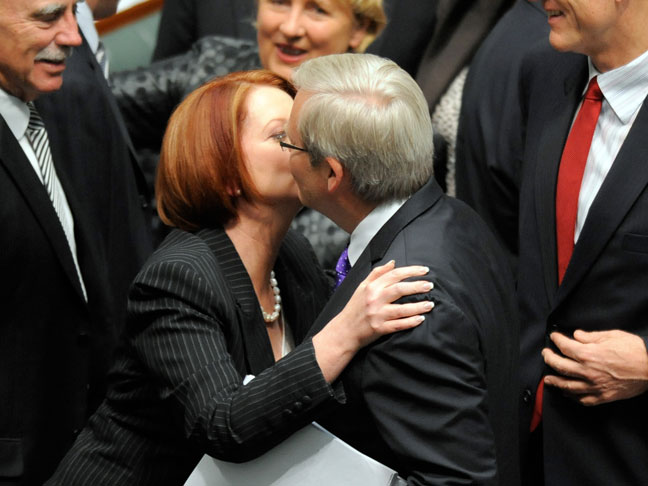The passage of carbon pricing legislation through the House of Representatives is a big step forward. [18 October 2011 | Peter Boyer]
There are the optimists among us, and then there’s the rest. I’ve always considered myself optimistic, which is why I’m applauding the seismic shift that happened in Canberra last week.
I had thought I’d devote this week’s space to the role of optimism in our lives. Events in Canberra forced me to postpone that, but it should be said that the story of an Australian carbon pricing scheme is a triumph of optimism (and national pride) over gloomy defeatism.
That’s not to say that the Gillard government’s bills for a two-stage carbon pricing scheme are beyond criticism. There may indeed be better mechanisms available to the national government, as has been said many times over the past few years.
But just as I defer to scientists when it comes to understanding natural processes, so do I rely on economists to clarify the benefits and drawbacks of economic processes — up to the point where these processes push against the physical constraints of Mother Earth.
As taxpayers we want bang for our buck. From all that I’ve heard and read, Australian professional economists are all but unanimous in the view that by far the most cost-effective way to curb carbon emissions on a national scale is to make people pay according to how much carbon they emit.
The economists vary on whether this is done by means of a fixed price (or tax) or a variable market-based mechanism. The Gillard government has taken the prudent course of doing both, one after the other. That is, the fixed price scheme due to begin next year will be succeeded in 2015 by an emissions trading scheme.
Last week’s vote on the “Clean Energy Future” plan was as big as it gets. The package is assured of passage through the Senate next month, but all members of the people’s house, where Julia Gillard clings to power by a single, negotiated seat, knew that the debate that ended last Wednesday would be a major turning point in the battle for a carbon pricing scheme.
The political ramifications are huge, which is why Tony Abbott fought so doggedly, using every means at his disposal right up to the final vote and beyond. He knows that his best chance to scupper the legislation disappeared when that vote was taken.
The response so far has been as varied as the opinions expressed during the debate, as we should expect. For Gillard and her government, as for the Australian Greens, it’s a triumph of good sense and good policy over short-term opportunism. For those who agree with Abbott, it’s a total disaster.
The attitude of business is shifting. From out-and-out opposition in times past, business umbrella groups appear now to have accepted that it will happen and started focusing on detail, such as the size of the price ($23 a tonne is way too high, they say) and what they need to do to get ready.
Elsewhere in the world, this is seen as an event of significance in the development of policy to limit carbon emissions. As Ross Garnaut asserted earlier this year, as a player on the world stage Australia is not without influence.
The passage of these bills has been noted, and will affect the positions of others. Conservative commentators in Britain and North America tended to take a pragmatic line, focusing on what the vote means for Gillard’s embattled government and the prospects for a future Abbott government.
Tim Worstall, of the Adam Smith Institute in London, was one who cheered the vote. “The economics of this is just right,” he said on the Forbes website. “There’s no reason at all that fighting climate change means a higher level of taxes in general.”
Revenue from a tax on carbon emissions would allow the government to lower other taxes — “which is exactly what Australia has done”, said Worstall. “And they’ve lowered the best tax to lower: income tax on the incomes of the poor. All of which is just excellent.”
I’m inclined to agree with Worstall, but as a lay observer I would never claim the final word. It’s safe to assume the truth is somewhere between the extremes.
By itself and left to its own devices, a carbon price will probably have limited effect. If, however, it’s diligently managed and accompanied by judicious, targeted regulatory measures supported by governments, corporate bodies and citizens, then we can be confident it will serve its high purpose.
So what are we left with? If the legislation passes the Senate in a few weeks, we will have a carbon pricing scheme in place from the beginning of July next year, with revenue funding compensation for households and business and a scheme to encourage investment in clean energy.
No political event in the meantime, such as someone crossing the floor to vote down the Gillard government, or a Labor leadership change, can alter that.
Tony Abbott swears on his blood that in power he’ll repeal the legislation, but that would mean taking back the compensation payable under the scheme to households and business. Not a pleasant prospect for nervous backbenchers.
Even if that passes muster with his party, with only half the Senate facing the polls and the Greens certain to retain the balance of power there, he will need a second, double dissolution election, hoping that this will give him the numbers in both houses to repeal the bills.
But unless Abbott can force an election very soon, by the time he gets around to a second one an emissions trading scheme with its myriad international market connections will be under way. All of which explains his air of desperation last week as the bills passed into the hands of the Senate.

